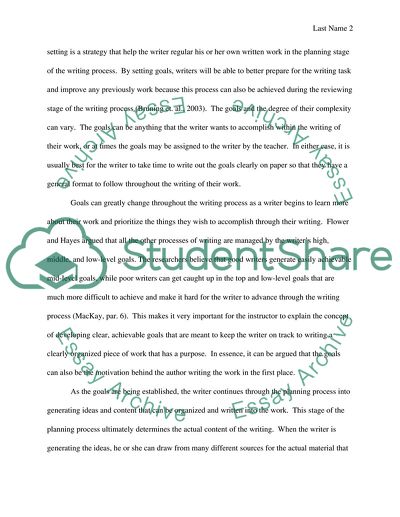Cite this document
(Stages of Writing Process Essay Example | Topics and Well Written Essays - 2000 words, n.d.)
Stages of Writing Process Essay Example | Topics and Well Written Essays - 2000 words. https://studentshare.org/journalism-communication/1557690-what-are-the-implications-for-instruction-if-effective-writing-requires-planning-which-includes-the-development-of-an-organisation-and-the-generation-of-content-information-translation-which-involves-converting-ideas-into-words-and-reviewing-wh
Stages of Writing Process Essay Example | Topics and Well Written Essays - 2000 words. https://studentshare.org/journalism-communication/1557690-what-are-the-implications-for-instruction-if-effective-writing-requires-planning-which-includes-the-development-of-an-organisation-and-the-generation-of-content-information-translation-which-involves-converting-ideas-into-words-and-reviewing-wh
(Stages of Writing Process Essay Example | Topics and Well Written Essays - 2000 Words)
Stages of Writing Process Essay Example | Topics and Well Written Essays - 2000 Words. https://studentshare.org/journalism-communication/1557690-what-are-the-implications-for-instruction-if-effective-writing-requires-planning-which-includes-the-development-of-an-organisation-and-the-generation-of-content-information-translation-which-involves-converting-ideas-into-words-and-reviewing-wh.
Stages of Writing Process Essay Example | Topics and Well Written Essays - 2000 Words. https://studentshare.org/journalism-communication/1557690-what-are-the-implications-for-instruction-if-effective-writing-requires-planning-which-includes-the-development-of-an-organisation-and-the-generation-of-content-information-translation-which-involves-converting-ideas-into-words-and-reviewing-wh.
“Stages of Writing Process Essay Example | Topics and Well Written Essays - 2000 Words”. https://studentshare.org/journalism-communication/1557690-what-are-the-implications-for-instruction-if-effective-writing-requires-planning-which-includes-the-development-of-an-organisation-and-the-generation-of-content-information-translation-which-involves-converting-ideas-into-words-and-reviewing-wh.


